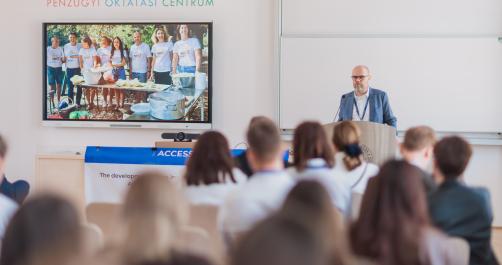
Enhancing Tourism Through Accessibility and Education at the University of Pécs
The University of Pécs in Hungary is making significant strides in the field of accessible tourism, emphasizing the importance of inclusive travel experiences and education. As tourism continues to evolve, the focus on accessibility and inclusivity reflects a broader understanding of human rights and economic growth associated with diverse traveler needs. This article explores how the University of Pécs is leading initiatives that shape the future of inclusive tourism and the role of education in fostering these developments.
The Role of the University of Pécs in Advancing Accessible Tourism
The University of Pécs has become a pioneering institution within Hungary and Central Europe in promoting accessible tourism education. Its involvement in the “Development of the Innovative Educational Method of Accessible Tourism in Central Europe” highlights its commitment to developing practical and policy-oriented solutions for universal accessibility. This initiative links academic research with real-world applications, aiming to elevate standards for travelers with disabilities across Hungary and beyond.
In 2021, the university launched the ACCESSIBLE project, uniting researchers, tourism boards, and advocacy groups across Central Europe. The project emphasizes bridging gaps between policy and practice to create more inclusive environments in tourism. According to research from the project, only a small percentage of hotels and tourist destinations are fully accessible, underscoring the need for educational and infrastructural improvements. The findings reveal that 79% of tourists without disabilities prefer destinations certified as inclusive — a clear indicator of market demand for accessible tourism.
Key Findings and Impact
Research conducted as part of the ACCESSIBLE project involved over 4,000 participants across five countries. One startling revelation was that only 11% of hotels in popular destinations could accommodate guests with mobility impairments. Such figures have driven the university and its partners to advocate for policy reforms and educational programs that raise awareness about accessibility needs.
Furthermore, the recognition of the University of Pécs as a certifiable institution in accessible tourism education cements its role as a leader in this domain. This accreditation encourages a multidisciplinary approach, combining marketing, hospitality, urban planning, and social sciences to build more inclusive tourism sectors.
Global Perspectives and Human Rights in Inclusive Tourism
Accessibility in tourism is not only a matter of convenience but also a fundamental human right. Professor Richard W. Butler, a renowned expert in tourism research, articulated that inclusivity should be integrated as a core principle rather than a niche concern. During a keynote speech at an international conference hosted by the University of Pécs, he emphasized that designing accessible tourism experiences benefits society at large, including the elderly, temporary impairments, and those with age-related mobility challenges.
This perspective aligns with the United Nations’ broader discourse on human rights, emphasizing that all individuals should have equal access to travel and leisure activities. Universities like Pécs play a pivotal role by incorporating these principles into their academic and practical training, shaping future industry leaders and policymakers.
Practical Strategies for Inclusive Tourism
- Implement Universal Design Principles: Ensure infrastructure, accommodations, and transportation are accessible to all.
- Promote Disability Awareness: Educate tourism professionals about various impairments and how to address them effectively.
- Develop Certification Programs: Create standards for inclusive tourism that encourage destinations to meet accessibility benchmarks.
- Incorporate Accessibility into Marketing: Highlight inclusive features to attract a broader segment of travelers.
- Collaborate Across Sectors: Foster partnerships between government, academia, and industry to develop comprehensive accessibility strategies.
The Educational Impact of the University of Pécs on Tourism and Inclusivity
The university’s involvement in accessible tourism education exemplifies its broader commitment to inclusive learning environments. It offers specialized courses that prepare students to lead reforms in tourism sectors, emphasizing sustainability, ethics, and innovation. Incorporating accessibility principles into tourism curricula ensures that upcoming professionals view inclusivity as a standard rather than an exception.
Students benefit from practical training through internships, workshops, and research projects that address current barriers in tourism infrastructures and services. Such experience equips graduates with the competencies needed to implement inclusive policies and design accessible travel experiences.
Expanding the Reach of Inclusive Education
Beyond tourism-specific programs, the University of Pécs promotes inclusive practices across faculties, integrating themes of accessibility and diversity into various disciplines. This holistic approach cultivates a future generation of professionals who prioritize human rights, social justice, and sustainable development in their careers.
Future Directions and Opportunities for the Industry
The ongoing initiatives at the University of Pécs signal a significant shift toward mainstreaming accessibility within the tourism industry. By continuously updating curricula, fostering research, and forming strategic partnerships, the university sets an example for other institutions in Hungary and Europe.
Policymakers and industry stakeholders are encouraged to adopt these educational insights, invest in accessible infrastructure, and develop marketing strategies that showcase inclusivity. As global travelers increasingly seek experiences that accommodate their diverse needs, embracing accessibility is not only ethical but also economically advantageous.
Building an Inclusive Future in Tourism
The University of Pécs’s leadership in accessible tourism and tourism education highlights the importance of integrating inclusivity into the core of industry development. Through research, education, and advocacy, the university helps to remove barriers that limit participation in travel and leisure, fostering a more equitable and sustainable tourism environment. For students, professionals, and policymakers, engaging with these initiatives is essential to advance a future where tourism benefits everyone, regardless of ability or background.
Ready to Explore? Learn More About the University of Pécs.
Fill out the form to schedule a free consultation and explore how the University of Pécs can support your academic and personal growth. Learn about available programs, admission requirements, and the exciting student experience that awaits you.

